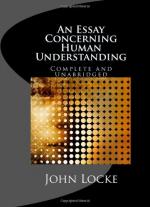
|
| Name: _________________________ | Period: ___________________ |
This quiz consists of 5 multiple choice and 5 short answer questions through Book II, Chapters 16-33.
Multiple Choice Questions
1. How does Locke define desire?
(a) The projection of happiness on things outside the self.
(b) The need to return to a previous bliss.
(c) The force that moves the world.
(d) The urgent need to merge with something outside the self.
2. How does Locke try to look at understanding?
(a) As the result of evolution.
(b) Relative to the passions.
(c) In a vacuum.
(d) Biologically.
3. Where does understanding originate, according to Locke?
(a) The collective unconscious.
(b) The senses.
(c) The genes.
(d) God.
4. What quality does Locke say innate principles lack?
(a) Presentability.
(b) Variability.
(c) Translatability.
(d) Universal consent.
5. What does Locke say liberty is aimed at?
(a) Pursuit of profit.
(b) Pursuit of happiness.
(c) Relief of suffering.
(d) Compassion for others.
Short Answer Questions
1. What does Locke say justifies moral principles?
2. Who proposed the notion that knowledge begins in doubt?
3. What does Locke say is his purpose in "Essay Concerning Human Understanding"?
4. What is Locke really discussing in his discussion of pleasure and pain?
5. What does Locke say about sensations that an infant feels in utero?
|
This section contains 225 words (approx. 1 page at 300 words per page) |

|




